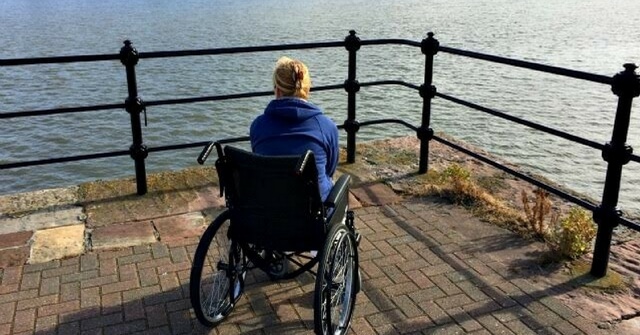I have been following along with the husband and wife duo of Rob and Bridget of The Bimblers for a couple years and absolutely love reading about their travels on their blog. They are frequently traversing the U.K., Ireland, and more of Europe, and they have me constantly dreaming of these destinations. I really enjoyed interviewing them for my Wheelie Inspiring Interview Series and I think that you’ll be impressed with them as well. Read below to learn why Rob and Bridget are known as Britain’s most unlikely travel bloggers.
Please tell us about yourself and what you do.
We are Bridget and Rob aka The Bimblers. We live in Liverpool in the United Kingdom and we’re currently travelling around the UK and Ireland in a wheelchair. Bridget is in her mid 40’s and I’m in my 50’s. Bridget suffers from Refractory Rheumatoid Arthritis which basically means she is untreatable and I’m asthmatic, have Fibromyalgia and a suspected heart problem. Collectively, our age and health problems earn us the accolade of being Britain’s most unlikely travel bloggers. Bridget has suffered for more than 20 years which has resulted in a lot of joint damage She currently has 8 dislocated joints in her hands, has had her wrist removed and pinned with a metal rod and is reliant on a wheelchair to move any meaningful distance. Because she has lost all practical use of her hands, she is unable to self-propel in her wheelchair. So far, I’ve been able to push her, but that is getting harder as my own health deteriorates. Our circumstances are not ideal, it would be much easier to stay at home, but we know there are many people in similar situations or worse so we carry on regardless. Our mission, if you can call it that, is to show people that travel is possible even with a disability. We’re not righteous, so we would never pretend to have all the answers. But, what we can do is write a blog about our experiences and hope it resonates with people and helps them take the leap and travel. As you can see by reading our blog, we mainly travel in the UK and Ireland. It was a conscious decision travel in the UK and Ireland because we believe there are so many beautiful destinations on our own doorstep, destinations that are often overlooked. We also have personal reasons for staying close to home and I think these reasons are important to many disabled travellers. The first one is access to healthcare. We know by staying in western Europe we have easy access to medical treatment should we need it. Worst case, if we have a problem when we’re travelling, we can quickly get home to our own medical teams. Secondly, given that our aim is to promote access in the tourism industry, we already know that most of the places we visit will be accessible. We’re lucky in the UK because accessibility is on the agenda and although not yet perfect, it is, for the most part, good. And finally, we have to consider the cost of travelling. This is the unspoken barrier to travel and we want to knock it down.

How did your passion for adventure begin?
I think it would be wrong to describe ourselves as adventurous, we’re far from it. We are best described as slow travellers because we take our time and like to immerse ourselves in a destination. Our name, The Bimblers, is taken from the word “Bimbling” because it describes how we travel. For those of your readers who’ve never heard the word bimbling it means “travelling slowly and without purpose” and that’s exactly what we do. As for the blog, it came about after a casual conversation in 2014. Bridget had recently had her wrist removed and was unable to do simple everyday tasks, and I had to give up my employment in the social justice sector to care for her. It was a dark time in our life. Obviously, the physical problems were stealing our independence but also, this enforced life change was playing havoc with our mental health. We decided we needed to do something instead of sitting at home festering. At the time, we’d heard of travel blogs but knew nothing about them, and we’d definitely never heard of the term accessible tourism. It’s wrong to say we didn’t love travel before this, we did, but we’d never considered it could become an all-consuming way of life. For years, I’d harboured dreams of circumnavigating the UK’s coastline in a campervan. But that’s all it was, a dream. Although we’re not exactly driving around in a campervan, we’re still visiting parts of the country we wouldn’t have visited and hopefully doing something useful which helps others in similar circumstances. I guess I saw an opportunity and went for it, somehow, we ended up blogging about our experiences in the accessible tourism niche.
What is the most wheelchair friendly place you have been to?
As I’ve already mentioned, we made a decision to play it safe. What that means is, we very rarely visit a place that’s inaccessible. I just don’t see the point in spending money on a disappointment. Because of our disabilities, we’re flexible, and fortunately, we don’t have as many challenges as some travellers. Therefore, all of the major cities we’ve visited have been accessible to us. Dublin, Ireland and Stratford Upon Avon stand out as accessible, as does our beautiful hometown of Liverpool. We live on an island and we are blessed with so many wonderful seaside towns. For us, there is nothing we love more than bimbling along a promenade with the wind in our hair and the smell of the sea engulfing our senses. The challenge arises when you head off into the countryside. But, I’m pleased to report that even areas like Dartmoor in Devon, the Peak District in Derbyshire and the Lake District in Cumbria are making great strides towards being accessible to all. We are very lucky in the UK because access is important. There are many national and regional organisations working tirelessly to make as much of the country as accessible as possible and that’s why we are such a popular destination.

What is the least accessible place you have visited?
I think it would be wrong to single out one particular place, especially as I’ve explained how we travel. The campaigner in me wants to pick a place, but I won’t because if a destination is trying to be accessible who am I to criticise. I think this comes back to why we blog. We only ever talk about what people can do, not what they can’t. Too many times I have read horror stories about people’s bad experiences only to find there was more to the story. Also, I have written reviews about a good experience then been vilified by someone who had a poor experience. Here’s what I know, one size doesn’t fit all and like our disabilities, we are all different and will experience things in different ways. Of course, I’m the first to criticise blatant breaches of accessible standards, but I don’t feel the need to become a keyboard warrior because not everyone views the world through my eyes.
What kind of problems have you come across while travelling in a wheelchair? How did you overcome them?
Again, we’ve been lucky and haven’t encountered too many problems. The wheelchair fell apart with Bridget in it, an accessible shower turned out to be a bath and I nearly killed myself pushing Bridget up a very steep hill, but it’s not what happens it’s how you deal with it that’s important. The truth is, stuff goes wrong, it happens to everyone. All any of us can do is plan, then plan some more. If you’ve done your homework, gathered the right information and built in your own unique needs, what else can you do. Things will still go wrong, and as I say, what you do about it matters more than the problem itself. I can’t remember who said it but these are wise words “we learn more from our failures than from our successes”… I agree wholeheartedly.

What are some of the top items on your bucket list?
Ultimately, Bridget and I would love to visit the major cities of America, see where my family originated from in Canada and sip juice outside the Opera House in Australia, but I doubt they’ll ever happen. To keep me busy in the meantime, I’d still love to travel the whole coastline of the UK and Ireland. We are sort of doing that albeit in a disjointed fashion and we’re loving every minute of it. The number one thing on our bucket list isn’t a place, it’s a wish and that’s to stay healthy enough to keep going.
Do you have any tips for other wheelchair users that might think travelling is not possible?
Yes, it’s cliched but just do it. You haven’t got to travel to the other side of the world, start in your own backyard. Explore your own city, see what the tourists see and enjoy what’s on your doorstep. Don’t be afraid to fail. Travelling with a disability is hard, things will go wrong, you’ll feel like giving up and on occasion, you might have to, but don’t let that stop you. Take baby steps, every successful journey, no matter how small will give you the confidence to go further. Travel expands your mind, gives you confidence and lifts your spirits. Living with a disability is challenging, any activity that cheers you up has got to be a good thing and for us, travel is that fix.

Most importantly, where to next?
Sadly, the start of the year has been dominated by poor health resulting in us cancelling a couple of trips. We’re gradually recovering and getting back on the horse so to speak. Over the next couple of months, we will be attending the Travel and Tourism Show and Naidex exhibitions in Birmingham and we’ll be reviewing a couple of accessible cottages in the Peak District and Lincolnshire. Currently at the planning stages for later in the year are a relaxing break in Cornwall, two visits to Ireland, a road trip on the Isle of Man and a return trip to Scotland. But, all of that could change in a heartbeat, we love to travel and we’ll go where it takes us.
To follow along with The Bimblers, visit their blog, Facebook page, or Twitter.







